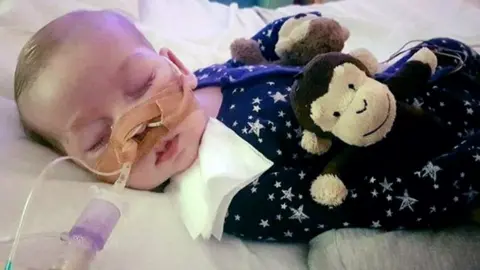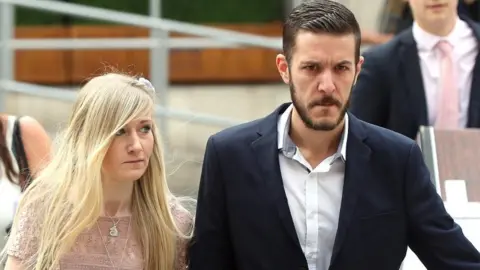Charlie Gard: US doctor meets Great Ormond Street medics
 PA
PAThe US doctor who has offered to treat terminally ill Charlie Gard has attended a meeting at Great Ormond Street Hospital to decide whether he should travel to America for therapy.
Dr Michio Hirano will discuss Charlie's condition with doctors treating him and independent specialists.
Great Ormond Street has given Dr Hirano an honorary contract giving him the same status as its own physicians.
It means he can examine Charlie and has full access to his medical records.
The visit has been arranged as part of the latest stage of a court fight, brought by Charlie's parents Connie Yates and Chris Gard, from Bedfont, south west London, over whether he should be given experimental treatment in America.
Judges have heard that Charlie, who was born on 4 August 2016, has a form of mitochondrial disease, a condition that causes progressive muscle weakness and brain damage.
Dr Hirano, a professor of neurology at the Columbia University Medical Centre in New York, has offered an experimental therapy called nucleoside.

Timeline
- 3 March 2017: Mr Justice Francis starts to analyse the case at a hearing in the family division of the High Court in London
- 11 April: He says doctors can stop providing life-support treatment
- 3 May: Charlie's parents ask Court of Appeal judges to consider the case
- 23 May: Three Court of Appeal judges analyse the case
- 25 May: The Court of Appeal judges dismiss the couple's appeal
- 8 June: Charlie's parents lose their fight in the Supreme Court
- 20 June: Judges in the European Court of Human Rights start to analyse the case, after lawyers representing Charlie's parents make written submissions
- 27 June: Judges in the European Court of Human Rights refuse to intervene
- 3 July: The Pope and US President Donald Trump offer to intervene
- 7 July: Great Ormond Street Hospital applies for a fresh hearing at the High Court

Last week, Great Ormond Street Hospital (GOSH) released a copy of its latest submission to the High Court.
In a statement published on its website, the hospital said: "At the heart of Charlie's parlous and terrible condition is the question, how can it be in his best interests for his life-sustaining treatment to be withdrawn?
"Charlie has been treated on GOSH's neonatal intensive care unit for many months now and very sadly, the question that arises for him arises for other patients and families at the hospital too."
 PA
PAThe hospital added it had treated more than 1,000 patients with mitochondrial disease and offered pioneering treatment, including nucleoside treatment, where appropriate.
"Despite all the advances in medical science made by GOSH and the other hospitals around the world, there remain some conditions that we cannot cure and we cannot ameliorate."
The hospital said it remained the unanimous view of its doctors that withdrawal of ventilation and palliative care were all the hospital could offer Charlie.
It said his treatment team and all those from who the hospital obtained second opinions were of the view Charlie had "no quality of life and no real prospect of any quality of life".
